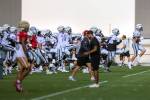State exempts 2 years of students from graduation testing requirements

Nevada high school freshmen and sophomores in 2014-15 lucked out Thursday when they were freed of the graduation requirement that has kept diplomas from thousands of past students, and will likely do the same for thousands more to come.
The exempt students will be taking four exams required to earn a diploma in Nevada, but unlike students before and after them, they don’t have to pass a single one to prove they mastered the minimum skills to be college or career ready, according to a unanimous decision Thursday by the Nevada Board of Education.
These two classes of students have been given a pass for no other reason than timing. The freshmen and sophomores are coming into high school as the state replaces its longstanding proficiency exams with tests given at the end of freshmen and sophomore math and English courses.
State lawmakers said these end-of-course exams must be implemented in 2014-15, and students need to pass them to graduate. However, the State Board decided Thursday that the first two classes taking the exams just need to earn a passing grade in the four correlating classes, which is a D in many Nevada districts.
Cue the collective grumbling – and potential lawsuits – from the multitude of past Nevada students who couldn’t graduate because they failed at least one of the four proficiency exams, or graduated only after retaking the exams time and time again over three years.
Thursday’s decision gave past students fuel for litigation against the state, said Allen Lichtenstein, attorney for the American Civil Liberties Union of Nevada. Students wouldn’t have much of a case if the state were simply changing its graduation requirements.
“But it’s giving some people a free pass,” Lichtenstein said Thursday.”They’re being treated differently.”
Handling the transition has been challenging for state education officials.
“This transition is a complex one,” said state Superintendent of Public Instruction Dale Erquiaga on Thursday, emphasizing how his staff has struggled to find a transition that would be fair to students caught between the old and new exams. “I have stopped banging my head against the wall trying to find the perfect answer and have realized we need a simple answer we can explain to mom and dad. For these two classes, graduation will mean taking the test and passing the class.”
State board member Allison Serafin agreed with granting the temporary reprieve from graduation exams, asserting that she feels “uncomfortable” tying graduation requirements to a “test unseen.” The new exams haven’t been created, let alone field tested with students to determine what passing scores will be.
These two classes – graduating in 2017 and 2018 – will still be taking the new end-of-course exams in math and English to provide results so the state can set passing scores, said state Deputy Superintendent for Student Achievement Steve Canavero. Students starting with the class of 2019 would then have to pass all four exams to graduate.
Another option would have been to field test the exams with next year’s freshmen and sophomores while also requiring them to pass the exams to graduate, Canavero said.
State board member Kevin Melcher supported the no-stakes testing for the classes of 2017 and 2018 but expressed concern over only requiring students to pass their 9th and 10th grade English and math courses, leaving it up to districts to define passing. And many districts call a D passing, he emphasized.
“We need to take a stand on what is passing,” he said.
Canavero said the state considered requiring students to earn a C in these courses instead of passing the new exams. But county school districts pushed back, arguing there’s “a lot of variability in course grades across districts and even schools.”
But the public may interpret this move as the state saying a D is the bar, Melcher warned.
The board also made a decision Thursday concerning another exam that state lawmakers required for implementation in the 2014-15 school year. All Nevada high schools are supposed to give juniors a “college and career readiness assessment.” The board hasn’t chosen the exam but has been talking of using either the SAT or ACT, which will be helpful for college-bound students, board members said.
But lawmakers gave the Nevada Department of Education no funding in the 2014-15 school year to buy and administer the exam, which students must take but they don’t have to reach any bar.
“The bottom line is there is no revenue budgeted to pay for this assessment,” said Erquiaga. “We can do nothing,” meaning no assessment next year. “I’m sure the Legislature will be mad. You can say, ‘We have no money.’”
The state Education Department also could request that the Legislature draw from Nevada’s emergency account used for disasters like wildfires. Lawmakers will almost certainly answer, “No,” Erquiaga said. Or the department could privately raise the estimated $1.7 million.
“I say we give it a shot,” Erquiaga said. “That’s as cheery as you’re going to get me today.”
The money must be raised by the end of May.
Contact Trevon Milliard at tmilliard@reviewjournal.com or 702-383-0279. Find him on Twitter: @TrevonMilliard.


















